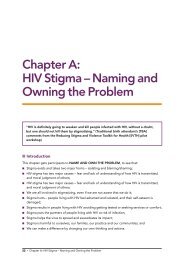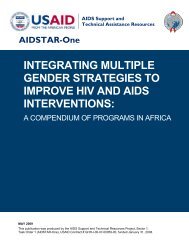Guide for Community Assessments on Women's Health Care - ICRW
Guide for Community Assessments on Women's Health Care - ICRW
Guide for Community Assessments on Women's Health Care - ICRW
Create successful ePaper yourself
Turn your PDF publications into a flip-book with our unique Google optimized e-Paper software.
A4. Sexually Transmitted Infecti<strong>on</strong>s (STIs)<br />
Many people have STIs without being aware of it due to lack of symptoms. This means that they may<br />
not feel any pain or discom<str<strong>on</strong>g>for</str<strong>on</strong>g>t.<br />
STIs are important to know about because if they are not treated they can have very damaging effects<br />
such as chr<strong>on</strong>ic pain, infertility and cervical cancer. If you are pregnant and have an untreated STI, the<br />
risk of infecting the baby with HIV and other infecti<strong>on</strong>s increases.<br />
It is now understood that the presence of an STI makes sexual transmissi<strong>on</strong> of HIV from <strong>on</strong>e partner<br />
to another much more likely.<br />
Protect yourself<br />
It is important to protect yourself against STIs. Practicing safe sex and using c<strong>on</strong>doms during<br />
penetrative sex is the <strong>on</strong>ly effective way to avoid STIs. STIs can really affect your health and may make<br />
the HIV disease progress more rapidly.<br />
Diagnosing<br />
Diagnosing an STI if you have no symptoms is not easy in many countries because screening is not<br />
always widely available. Screening <str<strong>on</strong>g>for</str<strong>on</strong>g> STIs and treating them is an effective way to slow down the<br />
numbers of new cases of HIV, and treatment is now increasingly being offered in antenatal clinics,<br />
maternal and child health clinics, and through family planning services.<br />
If your partner has STI symptoms but you d<strong>on</strong>’t, you should still get treatment.<br />
STIs – what to look out <str<strong>on</strong>g>for</str<strong>on</strong>g><br />
Women need to be aware of the following:<br />
●●<br />
●●<br />
●●<br />
●●<br />
●●<br />
Unusual bleeding from the vagina<br />
Unusual discharge coming out of the vagina or your partner’s penis<br />
Sores, lumps or a rash <strong>on</strong> or around the vagina, anus or your partner’s penis<br />
A burning feeling when you urinate<br />
Itching around the vagina or anus, or partner itching around the penis<br />
If you have or suspect you have an STI you can seek advice and treatment at a health center.<br />
Treatment<br />
Treatment of STIs can be fairly cheap and simple. Sometimes it is just <strong>on</strong>e dose of antibiotics.<br />
However different infecti<strong>on</strong>s need different treatments so it is important to get medical advice.<br />
If you are pregnant or planning to get pregnant, it is important to have antenatal care and to treat<br />
and clear up any existing STIs. STIs can infect the baby at birth and cause serious damage. It is also<br />
important to tell your health practiti<strong>on</strong>er if you are pregnant because this may affect the treatment<br />
you get.<br />
82 Annex A: Fact Sheets

















